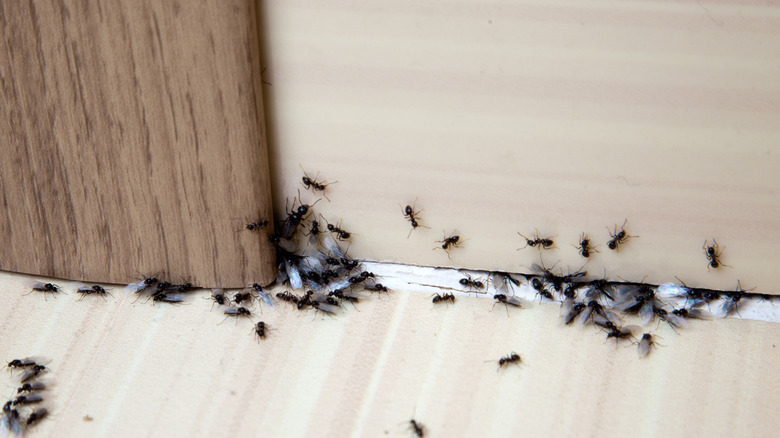Sprinkle This Secret Ingredient Around The House To Kick Ants To The Curb
Ants are one of the most annoying pests that invade our homes. They appear out of nowhere, can fit through any tiny hole, and travel in packs. When they find something they love in the kitchen pantry, there's no getting rid of ants until you seal every hole they come out of. Ants are more challenging to put a stop to than any other pest, such as fruit flies, spiders, and gnats, because of how large and stubborn their group is. Even if you use an ant-repellent spray to kill and prevent them from entering your home, they'll still find another entrance. Instead of spraying every corner with ant-repellent spray, sprinkle some thyme around your house to deter ants.
Growing fragrant plants around your yard or in your home is a natural remedy for preventing pests. Many pests are sensitive to scents that will have them running for the hills if they get a whiff of one they don't like. Ants have over 400 odor receptors, and sweet and greasy food attracts them the most, which is why you should always store food properly in sealed containers.
However, spreading some thyme will make them leave if you have a run-in with an ant infestation. While thyme has a sweet smell that you think would attract ants, it has anti-fungal properties that ants don't appreciate.
Why thyme works to repel ants
For humans, thyme is a sweet herb used when cooking, especially in soups and salads. It also has anti-fungal properties that work to repel ants. Ants, specifically leaf-cutter ants, foster fungus for food. According to the Department of Biology of Utah State University, leaf-cutting ants grow their gardens with disks they took from the leaves they cut. They create their food supply with the help of some fungi. Since the ants can't directly eat the leaves because they can't digest the cellulose found on the cell wall of the leaf, the fungus breaks down the cellulose and turns it into carbohydrates for the ants to eat. So, ants rely on fungi to help them survive.
When you find ants in your house, they take items full of carbohydrates. They eat candy, flour, and bread much easier than leaves in the yard. Sprinkling thyme around your house repels ants because it doesn't contain any nutritional benefits for them. It doesn't have any fungi the ants can take and use. The anti-fungal properties can harm the ants and their colony, so they avoid plants, herbs, and food that will threaten them.
Thyme is effortless to grow
If you usually spray down your home's exterior with an ant-repellent spray but still find ants in your home, try growing thyme. It's straightforward to grow because it thrives in the sun. Plus, it can grow anywhere, such as the cracks on the driveway and sidewalks. Ants will live in any spot they can find, especially if there's soil, so growing thyme in cracks will prevent ants from entering the soil and digging a tunnel underground that will lead them to the inside of your house. They'll make their way through any tiny hole in the corner of a room, doorframe, or outlet. Keeping them away from the soil will keep them away from your home.
Another excellent place to grow thyme is alongside your house. Whether you plant a small garden of it in front of your house under a windowsill or in the backyard with the rest of your plants, the herb will help deter ants from your home. Thyme is low maintenance, especially red creeping thyme, and it will also overcrowd unwanted weeds. If you have an ant and weed problem, you hit two birds with one stone. In addition, add a few thyme plants indoors. Place them in your hallways, entryways, kitchen, and garage to ensure ants stay away from your pantry and cupboards. However, if you don't want too much thyme around your house, sprinkling a few leaves around the outside occasionally is enough to scare ants away.


